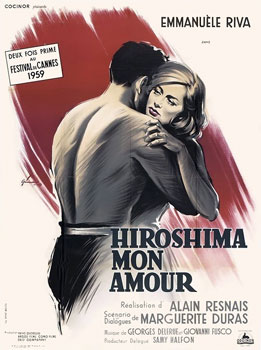Pages
▼
Friday, January 15, 2016
Hiroshima Mon Amour (Alain Resnais, 1959)
I remember the long dorm-room discussion after my friends and I saw this film for the first time, so I was surprised on returning to it after so many years how conventional the elements we talked about now seem. The extended use of documentary clips at the beginning of the film, with the voiceover by the lovers (Emmanuelle Riva and Eiji Okada) arguing about whether she had really seen anything in Hiroshima, seemed to us a bafflingly random way to start a movie. The jump cuts into and out of flashbacks confused us. What, we argued, did it signify that their entwined bodies, seemingly covered with ashes, then began to glow? (Today, I'm afraid some sarcastic voice will pipe up to say, "They've been glitter-bombed.") Why does she refer to her Japanese lover as "you" when she's actually talking about the German she loved during the war? Is the movie really about sleeping with the enemy? Doesn't it trivialize the horror of Hiroshima to bring it down to the level of the background for a love affair? Today, we'd regard those questions as naive, and I'm certain we wouldn't be confused by the film's structure, which is a way of saying that Resnais and his screenwriter, Marguerite Duras, really did succeed in revolutionizing movies. But if no one is startled by jump cuts or unconventional narrative devices today, there remains a raw immediacy about the film that no subsequent imitators have ever quite succeeded in equaling. Much credit also has to go to the score by Georges Delerue and Giovanni Fusco, and to the editing by Michio Takahashi and Sacha Vierny.
Charles Matthews
